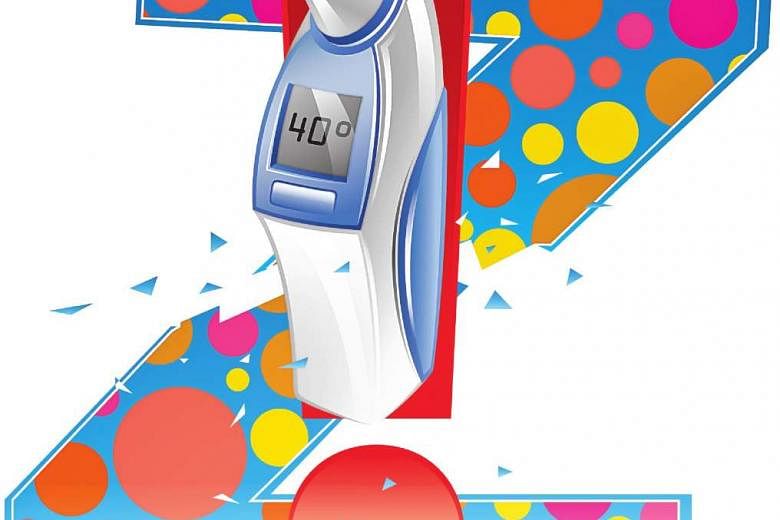Doctors who see children with fever can expect a few common questions from parents.
But they are often based on popular beliefs, and are without scientific basis. In some cases, the queries may make it more tricky for doctors to uncover the root of the problem.
Q Can a full blood count (FBC) be done to "look for bacterial infection"?
A Studies have shown that a FBC is inaccurate in diagnosing bacterial infections, even when the white cell count is higher than normal.
This is because a high white cell count can be caused by multiple reasons, such as vomiting, seizures, viral infections, burns and fractures.
Many children with viral infections look well and have abnormal full blood counts.
In my experience, when the child is clearly unwell enough for the doctor to diagnose a bacterial infection anyway, the FBC adds no value.
After all, a person's FBC can be normal even if he has a bacterial infection - non-typhoid salmonella and urinary tract infections are two common examples.
If the child is not obviously unwell, specific tests that seek out the site of the most likely illness would be more useful. For example, in infants with fever without source symptoms and who appear well, a urinary tract infection would be the most likely "serious infection" that they may have. So, a urine test would be the most prudent investigation.
Even if the test turns out negative, close follow-up and monitoring for new clues is the next best option, rather than a battery of tests that do not shed light on the source of the fever.
I am not saying the FBC should never be performed. It reveals useful information in certain conditions. For instance, it is often useful in monitoring the platelet level in dengue fever, especially after the third or fourth day of illness.
Q Can you prescribe antibiotics for my feverish child?
A Antibiotics are to be used only in specific bacterial infections, and do not work against viral infections or illnesses not caused by an infection, such as Kawasaki Disease.
Furthermore, even if the child has a bacterial infection, the type, dose and duration of the antibiotic to prescribe differ, depending on the source of infection.
Should a child have a prolonged fever with an unknown cause, it is usually better to carefully evaluate him, or refer him to a hospital if necessary, than to prescribe antibiotics. This is because the medication can cause side effects and, if so, muddies the water even further.
The doctor has to decide whether the clues that appear after the child starts taking antibiotics are linked to the medication or to the underlying illness. This makes it harder for the doctor to reach an accurate diagnosis and recommend the appropriate treatment.
I have often been told by fellow doctors that "parents ask for antibiotics or tests"; and by parents that "doctors ordered tests or gave antibiotics without explanation".
This can be blamed on a culture of expectation.
Some patients often ask for tests or antibiotics, not knowing that they may not always be beneficial.
Conversely, some doctors frequently perform these tests or prescribe antibiotics to children which, in turn, causes parents to expect such tests or antibiotics every time their child has a fever.
Q Can high fever cause brain damage?
A The answer is no, unless the child has a heat stroke or a temperature above 41 deg C.
Fever that arises from an infection or inflammation is part of the body's response to the underlying problem. It does not cause brain damage and rarely goes above 41 deg C.
As doctors, we worry about the source of the fever, as some problems can cause brain damage regardless of the temperature. This is why we often don't seem too concerned about the exact number on the thermometer.
If a child has acute meningitis, which is a bacterial infection of the brain covering, the exact temperature is irrelevant. The infection can, on its own, cause brain damage.
Q Does my child need antipyretics for the fever?
A Antipyretics are medications that bring down fever, such as paracetamol and ibuprofen.
Their purpose is to temporarily suppress, not cure, the fever. They help to make the child feel happier, drink and play, sleep well, and be less cranky.
But the goal is not to bring the temperature down to normal.
So, if a child has a temperature of 38 deg C while sleeping comfortably at night, there is no need to wake the child up just to treat a number on the thermometer.
Parents also ask if they should be worried if the fever does not disappear with antipyretics.
Studies have shown that there is no risk of serious illness, even if the fever does not disappear after taking antipyretics.
In fact, evidence shows that the presence of fever is a deliberate defence mechanism. It enhances the body's ability to fight off the infection, and slows down the growth of bacteria and viruses.
All in all, giving tender loving care, understanding what does and does not matter when the child is having a fever, and monitoring for clues that suggest deterioration or a different source of infection are the most important things parents can do for their child.
•Dr Soh Jian Yi is a consultant in the division of paediatric allergy, immunology and rheumatology at National University Hospital.

